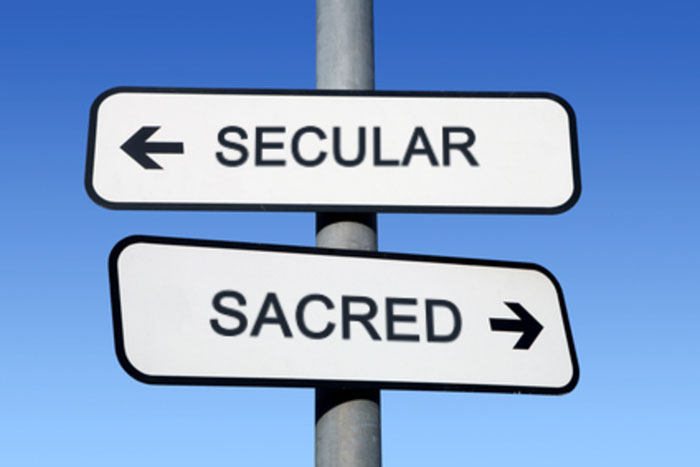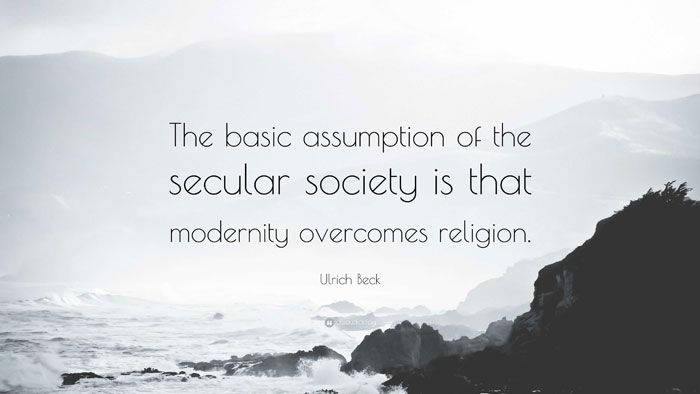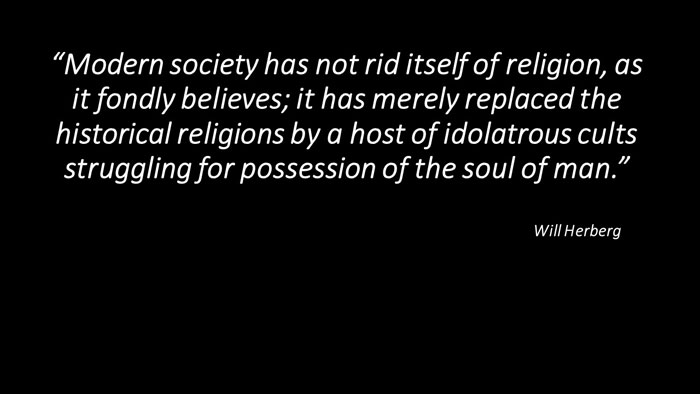It is interesting to note that the word secular has no meaning in and of itself. It is mostly defined as the absence of a religious or spiritual orientation, the lack of a moral code encompassing a transcendental meaning and purpose.
Everybody has some sort of overall view of the world as being a good or a bad place, or something in between. On a personal level this overall belief is played out in our thoughts, emotions, words and actions, our internal and external behaviour. Our goals and objectives reflect what we believe in. Maybe we believe that reaching our set objectives will make us happy. We believe in happiness because the possibility of happiness is included in our overall view of the world.
Each of us has our very own personal reality that we construct with our behaviour. This applies to anything and everything that people express. Even atheists believe. They believe that every man, women and child exists only for his or her own sake, and live accordingly.
In order to understand what being secular actually means, the question should not be whether people have a religious belief or not. The question is better phrased as ‘what do secular people believe?’ As a minimum we all have presumptive beliefs that underpin our opinion on life and the world. Even the absence of an opinion presumes a type of belief.
As behaviour has consequences, what one believes really matters. An important characteristic that world religions have in common is a moral code and axioms that are based on transcendence, Goodness and Truth. On the other hand secular people are, by definition, amoral and materialistic.
Morality stands on the pillars of reciprocity (fairness), empathy (compassion) and truth (reality). When these precepts are applied in our personal life, at community level and at national level we get the best results, the most harmony and wellbeing and the least conflict. This is how nature’s healthy eco-systems work.
When we share these moral values, we share a common reality that is a common religion or spirituality. As life is a spiritual journey it is dangerous and foolhardy to separate political and economic affairs from the moral beliefs of society. As reckless as the latter course may be, it is exactly what we have done in western societies. On the one hand we have mostly religious populations struggling to be true to their moral values and on the other hand we have political and corporate elites, national and supranational institutions that, being secular, do not consider themselves accountable to the same standard of moral behaviour.
From what I can surmise, the political class no longer feel that they have a duty of accountability and care towards the people who voted them in. Their interests and loyalties seem to lie elsewhere.
I am not surprised by the fact that people exist in positions of power and influence that display the narcissistic, Machiavellian and psychopathic traits of a dark triad personality, as is known in psychology. The extraordinary part is that entire populations allow such undesirable characters to rule over their life. We obviously should not permit any such person to have influence over any aspect of our lives as these dark triad types would have no scruples to cause us grave harm in order to achieve objectives that would normally have to do with greed, self-gratification and power.
It is not difficult for a dark triad personality to find himself or herself in a position of political or corporate power as he or she would use all means to get there, without any consideration of the consequences and harm caused to others. Such a person may outwardly appear to be harmless and may well be elected democratically.
The founders of western democratic nations had drawn upon Christian values in the drafting of our nations’ constitutional frameworks and in the setting up of our institutions. This was then. The vision of the founding fathers has been long lost. Unfettered by ethical or moral considerations, national and supranational politicians are as puppets in the hands of puppeteers, the national and international corporate lobbies. Of course, not all people with power over others are psychopaths. There are a few good people everywhere. However, as psychopaths are psychopaths, they tend to get into positions of power.
How do the powerful elite get entire populations to willingly comply? This is an interesting branch of psychology as the tyrannical abuse of communities and nations is an extrapolation of the abuser-victim pathology that is sometimes present in personal relationships.
A well-known method does exist for the manipulation of people. It starts with the deconstruction of people’s personal and shared realities. In the western nations such realities would largely have been entrenched in Christian values. The latter values are then replaced by propensities that facilitate domination and exploitation.
The toolkit for this nefarious purpose includes propaganda; imposing authority; dividing people physically, socially and semantically (by changing the meaning of words and concepts); spreading divisive and opposing narratives thereby creating conflict (divide and rule); cancellation of free speech; punishment and reward techniques; learned helplessness (getting people to give up); corrupting people with convenience. Not unlike Lucifer, secular people believe themselves to be God-like, to be free from consequence.
Victorious over Lucifer, Archangel Michael exclaimed “Who is like God!”. I wonder how a secular person would respond to such a charge.
This article was published in the Times of Malta on the 6th April 2024: The Secular Belief Conundrum
If you believe in a just and sustainable society, these other articles may interest you.



